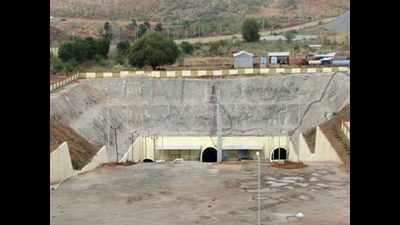- News
- City News
- Hyderabad News
- Andhra Pradesh: Uranium doses seeping into Kadapa groundwater
Trending
This story is from September 12, 2019
Andhra Pradesh: Uranium doses seeping into Kadapa groundwater
Dangerously high levels of uranium has been found in the groundwater near a mine that the Uranium Corporation of India Limited (UCIL) is operating in Andhra Pradesh’s Kadapa district. Although UCIL officials have denied any uranium seeping into the groundwater, the Andhra Pradesh Pollution Control Board (APPCB) has issued a show-cause notice to the corporation which reveals shocking numbers.

Uranium mine at Tummalapalle in Andhra Pradesh’s Kadapa district. Photo: ucil.gov.in
HYDERABAD: Dangerously high levels of uranium has been found in the groundwater near a mine that the Uranium Corporation of India Limited (UCIL) is operating in Andhra Pradesh’s Kadapa district. Although UCIL officials have denied any uranium seeping into the groundwater, the Andhra Pradesh Pollution Control Board (APPCB) has issued a show-cause notice to the corporation which reveals shocking numbers.
Tests conducted at borewells in villages near the mine showed the presence of uranium to be ranging between 690 parts per billion (ppb) and 4,000 ppb when the permissible limit for drinking water according to the Atomic Energy Regulatory Board is 60 ppb. Many local residents have already approached APPCB, showing warts and lumps on their bodies, apparently after being exposed to the water.

The showcase notice was issued on August 7. APPCB’s zonal office at Kurnool collected water from the monitoring borewells around villages in and around UCIL’s tailing ponds in Tummalapalle of Vemula mandal in Kadapa district.
The APPCB notice states that groundwater in the villages of Mobbuchintalapalli, K K Kotta and Kannampalli are “badly affected due to the presence of high alkalinity and uranium concentration. High concentrations of both these parameters may be due to UCIL mining as they use the alkaline leaching method for producing
According to the clearance given by the Union ministry of forests and environment, the tailing ponds have to be lined properly to prevent groundwater contamination. The overflow must be collected, treated and recycled for the ore processing plant. It clearly says that no water must escape from the pond.
"UCIL failed to line the tailing pond with 250-micron polythene layer as directed in consent for operation order of the PCB," the notice says.
UCIL replied that it had followed AERB guidelines. The tailing pond is thickened with appropriate clay material with desired thickness to attain the stipulated permeability.
However, APPCB said UCIL should have lined the layer with polythene as extra precaution.
APPCB sent the notice after Kadapa MP YS Avinash Reddy and villagers from surrounding areas complained about contamination of the groundwater because of UCIL not thickening the tailing ponds resulting in uranium pollution.
NGO Human Rights Forum’s Kadapa convenor, K Jayasree, told TOI, "An 11-member committee of the APPCB with experts inspected UCIL on September 9 and visited six affected villages a day later. Locals complained of skin disease, keen pain and itching lumps appearing on their bodies.”
Tests conducted at borewells in villages near the mine showed the presence of uranium to be ranging between 690 parts per billion (ppb) and 4,000 ppb when the permissible limit for drinking water according to the Atomic Energy Regulatory Board is 60 ppb. Many local residents have already approached APPCB, showing warts and lumps on their bodies, apparently after being exposed to the water.

The showcase notice was issued on August 7. APPCB’s zonal office at Kurnool collected water from the monitoring borewells around villages in and around UCIL’s tailing ponds in Tummalapalle of Vemula mandal in Kadapa district.
UCIL director (technical) SR Pranesh told TOI, “There are several myths and misconception regarding uranium contamination. PCB has formed a committee of experts. Let us wait for their report."
The APPCB notice states that groundwater in the villages of Mobbuchintalapalli, K K Kotta and Kannampalli are “badly affected due to the presence of high alkalinity and uranium concentration. High concentrations of both these parameters may be due to UCIL mining as they use the alkaline leaching method for producing
sodium di-uranate.”
According to the clearance given by the Union ministry of forests and environment, the tailing ponds have to be lined properly to prevent groundwater contamination. The overflow must be collected, treated and recycled for the ore processing plant. It clearly says that no water must escape from the pond.
"UCIL failed to line the tailing pond with 250-micron polythene layer as directed in consent for operation order of the PCB," the notice says.
UCIL replied that it had followed AERB guidelines. The tailing pond is thickened with appropriate clay material with desired thickness to attain the stipulated permeability.
However, APPCB said UCIL should have lined the layer with polythene as extra precaution.
APPCB sent the notice after Kadapa MP YS Avinash Reddy and villagers from surrounding areas complained about contamination of the groundwater because of UCIL not thickening the tailing ponds resulting in uranium pollution.
NGO Human Rights Forum’s Kadapa convenor, K Jayasree, told TOI, "An 11-member committee of the APPCB with experts inspected UCIL on September 9 and visited six affected villages a day later. Locals complained of skin disease, keen pain and itching lumps appearing on their bodies.”
End of Article
FOLLOW US ON SOCIAL MEDIA










